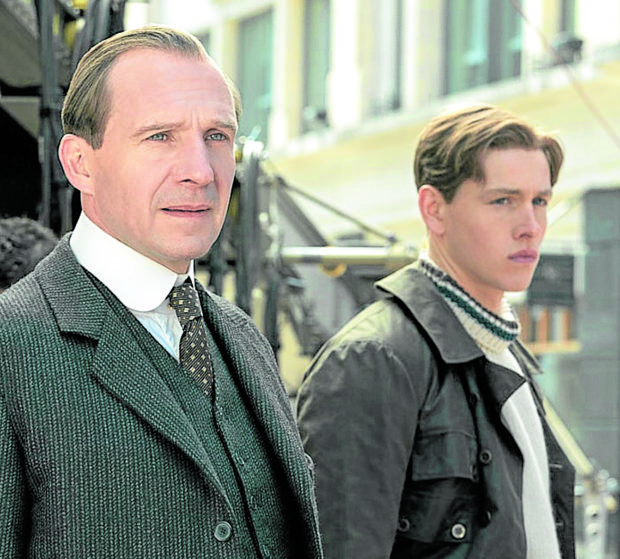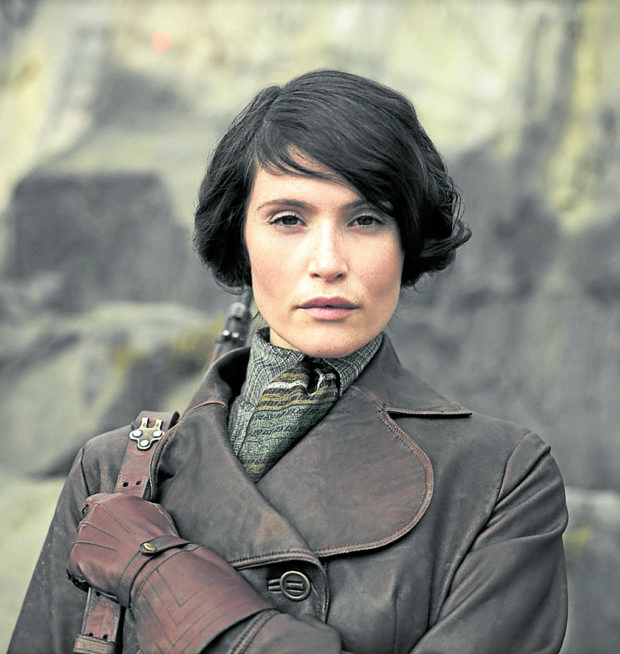Ralph Fiennes and Gemma Arterton on fighting evil, expanding ‘King’s Man’ franchise

Ralph Fiennes (left) and Harris Dickinson in “The King’s Man” —PHOTOS courtesy of DISNEY PHILIPPINES
We stood for more than three and a half hours just to see Ralph Fiennes in the four-act play “Man and Superman” at the National Theatre in London in 2015. A few days later, we watched Olivier-nominated Bond girl Gemma Arterton (“Quantum of Solace”) stretch her thespic wings in the screen-to-stage musical adaptation of “Made in Dagenham” at the Adelphi Theatre.
So you can imagine how thrilled we were when we spoke to both actors together, albeit virtually, not only to discuss the “Kingsman” prequel “The King’s Man,” which begins its run in Philippine cinemas on Wednesday, but also to pick their brains about creating a character.
Our chat with Ralph, Gemma and their director, who talked to us in a separate interview, discussed why we must heed the warnings that can be gleaned from history, the sacrifices we make for country and family, and how a person’s reputation goes hand in hand with his character.
“The King’s Man,” written and directed by Matthew Vaughn (“Kick-Ass,” “X-Men: First Class,” “Kingsman: The Secret Service”), doesn’t really take place immediately before the adventures of Harry Hart (Colin Firth) and Eggsy (Taron Egerton) in 2014’s “The Secret Service” and 2017’s “The Golden Circle.”
But the film takes viewers back to the origins of the very first intelligence agency put up by British aristocrat Orlando, the Duke of Oxford (Ralph) with the help of his trusted assistants, Shola (Djimon Hounsou) and Polly (Gemma), and his passionate only son Conrad (Harris Dickinson) in the first decade of the 20th century.
Article continues after this advertisementRethink approach
The Duke swore off violence and decided to become a pacifist after his beloved wife Emily (Alexandra Maria Lara) succumbed to a sniper attack during a visit to a concentration camp in South Africa during the Boer War in 1902.
Article continues after this advertisementBut as the world spirals into madness, and with history’s worst tyrants and criminal minds busily conspiring to plot a global war aimed at wiping out millions of people, Oxford is forced to rethink his fence-sitting approach to conflict.
“The key difference between this and those two films is that Conrad and I are actually father and son,” Ralph said when asked to compare his film and the Taron-Colin starrers. “I have known my son Conrad since he was born. The history of what we have shared, which is something tragic, is at the center of our dynamic. We’re very close because of that.
“But then, it’s no secret that the Duke of Oxford is a committed pacifist. And as the first World War approaches, of course my son is eager to prove himself as a soldier, and that becomes a cause of real tension between us, because of the Duke’s view of conflict.
“He’s against going to war. He thinks there are other ways of defeating the enemy, and that’s not necessarily by engaging in an all-out war. With Colin and Taron’s characters, that’s an evolving relationship. In our case, this is very much a blood tie between father and son.”
There’s something else that sets the movie apart from other espionage films, explained Gemma: “The fact that it’s rooted in historical context and events gives ‘The King’s Man’ a certain depth and a little more weight compared to the original films, which were contemporary. But while there’s something more sprawling and epic about it visually, you know that similarities exist—they’re fun and full of action and adventure.”
Storytelling style
And then, there’s also its director’s idiosyncratic storytelling style, Ralph added, “A lot of other big-budget spy films are products of a studio or a group of producers. This film, however, is highly defined by Matthew’s unusual take on things, coupled with a weird sense of humor.
“I never quite know what to expect in Matthew’s films. When I watched the first two ‘Kingsman’ productions, I was always pleasantly surprised by what he did with character, humor and the action sequences. There’s a slight anarchy in his approach. He isn’t afraid to go against the convention. The Matthew Vaughn spirit really defines the ‘Kingsman’ movies against other espionage films.”
“The King’s Man’s” all-star cast also includes Rhys Ifans (as Grigori Rasputin), Matthew Goode (Captain Morton), Tom Hollander (King George), Daniel Bruhl (Erik Jan Hanussen), Charles Dance (Herbert Kitchener), Aaron Taylor-Johnson (Archie Reid) and Stanley Tucci (as US President Woodrow Wilson).

Gemma Arterton
Our Q&A with Ralph and Gemma:
Is there something you’ve learned from the movie, perhaps from one of your lines, that you want young people these days to get empowered by?
Ralph: In the movie, I say to my son, ‘Reputation is what people think of you, but your character is what you are”—and I quite like that distinction. I was always encouraged as a child not to worry about what people thought of me. Your interior actions and sense of responsibility to yourself are more important. I suppose Matthew is saying, “Your inherent self is your character, and everything else is just the perception of other people”—and that’s an absolute difference to bear in mind.
Gemma: From Polly’s perspective, I have a line early on in the film where I say, “The more you fear something, the more likely it is to happen.” And that’s very true. There are little tidbits of wisdom like that in the film mixed in with all its crazy, fun elements.
Sequels and prequels tend to repeat themselves. So, what convinced you to take part in the third installment of this franchise?
Ralph: It’s a very good question. I did have some apprehension about this, but when I read the screenplay, I thought Matthew wasn’t just repeating himself. For a start, all the characters were different, and he brought this historical context centered around the first World War.
Matthew had to balance the production’s tragic and dramatic moments and marry them with the franchise’s sense of fun, irreverence and campy anarchy. And as an actor, I liked the strong dramatic role and his interior journey. I thought the film needed the relationship between Conrad and the Duke to be quite heavily invested with true emotions.
Gemma: I was initially dubious about it because you don’t want to pick up someone else’s laundry. But it has turned out to be very different. And this being a prequel, you can reinvent the whole thing.
More than that, the character was just so much fun to pass up. So, it was a no brainer for me. I don’t usually make decisions that quickly, but when I read the script, I thought, “I want to have fun!” Also, I’ve wanted to work with Matthew for a long time.
Is there a part of you in your characters?
Gemma: I do think there’s a little bit of me in Polly, and Matthew actually encouraged that. He’d say, “Come on, get a bit more of Gemma in there!” I’d say, “What’s that like?” And he’d say, “You know, the little cheeky or sparkly thing?” So, there’s a bit of me in there, although Polly’s much more intelligent than me—and certainly better at math (laughs).
Ralph: Yes, I always think there’s a bit of every actor in every part. Sometimes, I have to find that bit of me to play someone who’s not like me at all. But in this case, I definitely feel that there is. I’ve also met maybe one or two of my father’s friends who are a bit like the Duke of Oxford—and I could also draw from even my father himself.
Gemma, the film takes some liberties with history. Can you talk about your character being a woman in relation to that turbulent period in history with the suffragettes and all that?
Gemma: While our story does not center around the suffragette movement, I’d like to think that Polly was incredibly high up in that movement in perhaps another side project of hers (laughs). Indeed, that period was a pivotal moment for women, and I think Polly is just an embodiment of all that strength, conviction, passion, intelligence and energy.
Ralph, how did you wish to project that “Englishness” in the Duke of Oxford?
Ralph: There’s no way you can skirt around the fact that he is an aristocrat, which is probably highly uncool in this current climate. But what Matthew wants to get across is a certain Englishness that even when you’re born into the upper class, you’re responsible to embody a sense of service to others—like the Knights of the Round Table, where you stand by the Arthurian principle driving chivalric knights to fight demons, dragons and other aspects of evil. I don’t know if that’s necessarily English, but I know it’s very much a cultural thing. To put it simply, it’s about a code of responsibility.